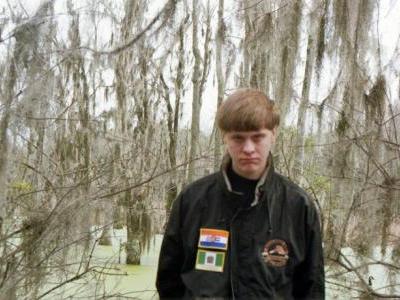Fri, 06/19/2015 - 10:24
Another shooting, another case of US exceptionalism
More than 10,000 kilometers, three decades and a hemisphere separates Dylann Roof from the defunct southern African state of Rhodesia.
But that didn’t stop the 21-year-old suspect in Wednesday’s deadly shooting at a South Carolina black church from identifying with a racist African state that ceased to exist long before he was born.
A photograph posted on Facebook of the suspect in the Emanuel AME Church shooting showed a glowering, blond, mop-topped youth sporting a black parka adorned with the flags of apartheid-era South Africa and Rhodesia, the white-ruled country that became Zimbabwe in 1980.

The photograph has not been confirmed by law enforcement officials. But friends and acquaintances of the young man who is alleged to have killed nine people at a Bible study class at Emanuel AME (African Methodist Episcopal) Church have identified him in US media interviews.
Suspect profiles that emerge shortly after major attacks typically feature family members and neighbors expressing their bafflement to reporters, insisting that the person they’ve known could not have committed such a heinous crime.
But in Roof’s case, the picture unfolding is one of a perfect troubled suspect: a withdrawn boy with a spotty school record, signs of paranoia, and a criminal record with misdemeanor and drug possession charges.
More disquieting still are all the signs of a societal malaise that enabled a disturbed white boy in the American South to graduate from an unknown high school dropout to a nationally recognized alleged murderer.
In the aftermath of the horrific Charleston, South Carolina church attack, some of these issues will be explored by the media and politicians. But if history is anything to go by, the root causes are not likely to be addressed or resolved and the lessons of the Emanuel AME Church shooting are likely to be forgotten –- until the next shooting incident hits the national and international headlines.
From Transatlantic slavery to the Confederacy
On Wednesday night, when Roof allegedly opened fire during a Bible study class at the historic black Charleston institution, he reportedly repeated that he had to keep shooting.
“He just said, ‘I have to do it,’” Sylvia Johnson, a survivor of the attack, told NBC News. “‘You rape our women, and you’re taking over our country, and you have to go,’” Johnson quoted Roof as saying.
Shortly after the shooting, which killed nine people -– including lead pastor Rev. Clementa Pinckney, two other males and six females -– Roof fled the church in a Hyundai sedan with Confederate flag license plates, according to US news reports.
From the Civil War-era Confederate states of the Deep South to the white supremacist political ideologies once practiced on a continent from which his victims were shipped and enslaved, Roof’s crime bears the burden of history, a dark history that lives in troubled, nostalgic peripheries of society.
Obama says the same thing -- again
In an interview with Reuters, Roof’s uncle, Carson Cowles, gives every indication that at least some members of his family were not blind to the young man’s problems. Cowles, a brother of Roof’s mother, reportedly expressed his concerns about his nephew to his sister. “I said he was like 19 years old, he still didn’t have a job, a driver’s license or anything like that and he just stayed in his room a lot of the time,” Cowles reportedly told his sister.
And yet, the unemployed 21-year-old with a petty crimes record was able to secure a gun. Reports of how Roof got the Glock .45-caliber pistol that allegedly killed his nine victims vary. Some reports say his father gifted him the gun on his 21st birthday. Others say he used his birthday money to buy a gun.
Shortly after Roof was arrested at a Shelby, North Carolina traffic light Thursday, US President Barack Obama attempted to reignite the national gun control debate – as he has more than a dozen times after a mass shooting. “I have had to make statements like this too many times. Communities like this have had to endure tragedies like this too many times,” said a grim Obama. “We do not have all the facts, but we do know that once again, innocent people were killed because someone who wanted to inflict harm had no trouble getting their hands on a gun. Now is the time for mourning and for healing, but let’s be clear: At some point this country will have to reckon with the fact that this type of gun violence does not happen in other advanced countries. It does not happen in other places with this kind of frequency.”
And yet, the US gun debate proceeds in a bubble of isolation and American exceptionalism.
Reporting from Charleston, FRANCE 24’s Philip Crowther noted that, “The discussions here are more about racial problems in the United States rather than gun control. What people here fear more than anything is not the gun itself, it’s rather the motive in this case,” said Crowther. “People don’t necessarily want to hear the president speaking about gun control.”
South Carolina ranks among the US states with the most permissive gun laws, with the California-based Law Center to Prevent Gun Violence giving the state an “F” for gun safety.
The state does not require background checks on private gun sales and has no requirements for registration or permits for any weapons, except for carrying handguns. Nor does it require a legal permit to receive and possess a firearm as a gift.
The limits of the top US job
Since Obama took office in 2009, the US has been shaken by multiple mass shooting incidents, including the harrowing December 2012 attack by a 20-year-old gunman at a Newtown, Connecticut elementary school, which killed 20 little children and six staff members.
Following the Sandyhook elementary school shooting, there was a Congressional attempt to push through the Manchin-Toomey gun amendment (named after Democratic Sen. Joe Manchin and Republican Sen. Pat Toomey) which would require background checks on all commercial gun sales.
The bill was opposed by the powerful National Rifle Association (NRA) and even the modest, bipartisan Manchin-Toomey amendment failed to pass the Democratic-controlled Senate in 2013. In the 2014 midterms, the Senate moved to Republican control and the Manchin-Toomey – or any gun control measure, for that matter – has remained off the Washington agenda since.
Following the Charleston church shooting, the NRA has declined to comment on the issue and NRA representatives have told reporters off-the-record that the organization is sticking to the policies it upholds after any shooting incident, namely, “guns don’t kill people, people kill people”.
Meanwhile Obama -- the country’s first black president with an acute understanding of how disproportionately the Second Amendment on the right to bear arms affects the African American community –- is aware of the limits of the USA’s top office on this intractable issue.
"The politics in this town foreclose a lot of those avenues right now," said Obama, referring to gun control measures. “At some point it's going to be important for the American people to come to grips with it, and for us to be able to shift how we think about the issue of gun violence collectively."
That point unfortunately hasn’t yet come. And even if it does arrive in some distant future, for the victims of the Emanuel AME Church shooting, it will be too late.
But that didn’t stop the 21-year-old suspect in Wednesday’s deadly shooting at a South Carolina black church from identifying with a racist African state that ceased to exist long before he was born.
A photograph posted on Facebook of the suspect in the Emanuel AME Church shooting showed a glowering, blond, mop-topped youth sporting a black parka adorned with the flags of apartheid-era South Africa and Rhodesia, the white-ruled country that became Zimbabwe in 1980.

The photograph has not been confirmed by law enforcement officials. But friends and acquaintances of the young man who is alleged to have killed nine people at a Bible study class at Emanuel AME (African Methodist Episcopal) Church have identified him in US media interviews.
Suspect profiles that emerge shortly after major attacks typically feature family members and neighbors expressing their bafflement to reporters, insisting that the person they’ve known could not have committed such a heinous crime.
But in Roof’s case, the picture unfolding is one of a perfect troubled suspect: a withdrawn boy with a spotty school record, signs of paranoia, and a criminal record with misdemeanor and drug possession charges.
More disquieting still are all the signs of a societal malaise that enabled a disturbed white boy in the American South to graduate from an unknown high school dropout to a nationally recognized alleged murderer.
In the aftermath of the horrific Charleston, South Carolina church attack, some of these issues will be explored by the media and politicians. But if history is anything to go by, the root causes are not likely to be addressed or resolved and the lessons of the Emanuel AME Church shooting are likely to be forgotten –- until the next shooting incident hits the national and international headlines.
From Transatlantic slavery to the Confederacy
On Wednesday night, when Roof allegedly opened fire during a Bible study class at the historic black Charleston institution, he reportedly repeated that he had to keep shooting.
“He just said, ‘I have to do it,’” Sylvia Johnson, a survivor of the attack, told NBC News. “‘You rape our women, and you’re taking over our country, and you have to go,’” Johnson quoted Roof as saying.
Shortly after the shooting, which killed nine people -– including lead pastor Rev. Clementa Pinckney, two other males and six females -– Roof fled the church in a Hyundai sedan with Confederate flag license plates, according to US news reports.
From the Civil War-era Confederate states of the Deep South to the white supremacist political ideologies once practiced on a continent from which his victims were shipped and enslaved, Roof’s crime bears the burden of history, a dark history that lives in troubled, nostalgic peripheries of society.
Obama says the same thing -- again
In an interview with Reuters, Roof’s uncle, Carson Cowles, gives every indication that at least some members of his family were not blind to the young man’s problems. Cowles, a brother of Roof’s mother, reportedly expressed his concerns about his nephew to his sister. “I said he was like 19 years old, he still didn’t have a job, a driver’s license or anything like that and he just stayed in his room a lot of the time,” Cowles reportedly told his sister.
And yet, the unemployed 21-year-old with a petty crimes record was able to secure a gun. Reports of how Roof got the Glock .45-caliber pistol that allegedly killed his nine victims vary. Some reports say his father gifted him the gun on his 21st birthday. Others say he used his birthday money to buy a gun.
Shortly after Roof was arrested at a Shelby, North Carolina traffic light Thursday, US President Barack Obama attempted to reignite the national gun control debate – as he has more than a dozen times after a mass shooting. “I have had to make statements like this too many times. Communities like this have had to endure tragedies like this too many times,” said a grim Obama. “We do not have all the facts, but we do know that once again, innocent people were killed because someone who wanted to inflict harm had no trouble getting their hands on a gun. Now is the time for mourning and for healing, but let’s be clear: At some point this country will have to reckon with the fact that this type of gun violence does not happen in other advanced countries. It does not happen in other places with this kind of frequency.”
And yet, the US gun debate proceeds in a bubble of isolation and American exceptionalism.
Reporting from Charleston, FRANCE 24’s Philip Crowther noted that, “The discussions here are more about racial problems in the United States rather than gun control. What people here fear more than anything is not the gun itself, it’s rather the motive in this case,” said Crowther. “People don’t necessarily want to hear the president speaking about gun control.”
South Carolina ranks among the US states with the most permissive gun laws, with the California-based Law Center to Prevent Gun Violence giving the state an “F” for gun safety.
The state does not require background checks on private gun sales and has no requirements for registration or permits for any weapons, except for carrying handguns. Nor does it require a legal permit to receive and possess a firearm as a gift.
The limits of the top US job
Since Obama took office in 2009, the US has been shaken by multiple mass shooting incidents, including the harrowing December 2012 attack by a 20-year-old gunman at a Newtown, Connecticut elementary school, which killed 20 little children and six staff members.
Following the Sandyhook elementary school shooting, there was a Congressional attempt to push through the Manchin-Toomey gun amendment (named after Democratic Sen. Joe Manchin and Republican Sen. Pat Toomey) which would require background checks on all commercial gun sales.
The bill was opposed by the powerful National Rifle Association (NRA) and even the modest, bipartisan Manchin-Toomey amendment failed to pass the Democratic-controlled Senate in 2013. In the 2014 midterms, the Senate moved to Republican control and the Manchin-Toomey – or any gun control measure, for that matter – has remained off the Washington agenda since.
Following the Charleston church shooting, the NRA has declined to comment on the issue and NRA representatives have told reporters off-the-record that the organization is sticking to the policies it upholds after any shooting incident, namely, “guns don’t kill people, people kill people”.
Meanwhile Obama -- the country’s first black president with an acute understanding of how disproportionately the Second Amendment on the right to bear arms affects the African American community –- is aware of the limits of the USA’s top office on this intractable issue.
"The politics in this town foreclose a lot of those avenues right now," said Obama, referring to gun control measures. “At some point it's going to be important for the American people to come to grips with it, and for us to be able to shift how we think about the issue of gun violence collectively."
That point unfortunately hasn’t yet come. And even if it does arrive in some distant future, for the victims of the Emanuel AME Church shooting, it will be too late.
Tags for all blogs :
Comments or opinions expressed on this blog are those of the individual contributors only, and do not necessarily represent the views of FRANCE 24. The content on this blog is provided on an "as-is" basis. FRANCE 24 is not liable for any damages whatsoever arising out of the content or use of this blog.




1 Comments
Post new comment